Friday, September 27, 2013
Thursday, September 26, 2013
South Korean Choco Pie in North Korea
.jpg) |
| Source |
Some North Koreans have been shelling out up to a fifth of the average monthly income for a single chocolate snack, it's claimed.
Supplies of Choco Pie, a Wagon Wheel-style chocolate, biscuit and marshmallow snack, dried up earlier this year when Pyongyang closed Kaesong Industrial Complex - a collaborative venture between the two nations - amid heightened tensions in the region. The industrial zone's 35,000 workers had been receiving Choco Pies in their lunchboxes from their South Korean employers, and many sold them on the black market as a means of supplementing their income. Once supplies were disrupted, they ended up changing hands for 3,000 ($23 or £14), according to the Daily NK website. There are no accurate average wage statistics for North Korea but analysts estimate per capita income at between $1,000 and $2,000 per year.
Pyongyang seemingly launched a copycat version but people reportedly complained they were too sweet. With Kaesong's recent re-opening, the snack's black market value plummeted, and they're now reportedly selling for 500 won (about $4; £2.50). However, it's not all good news. Southern employers, citing the losses they've taken due to the plant's enforced closure, have taken the opportunity to slash the number of Choco Pies they hand out, Daily NK reports.
I think even for a regular vistor in Seoul, Choco Pies is a replacemnet of a souvenier from Korea. A good gift to give to friend and family.
Labels:
Buzz Korea,
Choco Pie
Wednesday, September 25, 2013
HUMAIRA: THE DREAM CATCHER by Sharmeen Obaid-Chinoy with voiceover from ...
The voiceover for "Humaira: The Dream Catcher" is by Madonna.
An amazing documntary.
Khalida Brohi at Clinton Global Initiative
Khalida Brohi is a social entrepreneur from Pakistan. She received her BA in international relations, sociology, and economics from the University of Karachi in Pakistan. Currently, Khalida is the program manager of Sughar Women, a program of the Participatory Development Initiatives (PDI) that works to engage customs to end customary violence against women in tribal areas of Pakistan by providing socio-economic empowerment to women, and education to tribal leaders and men about the status of women. She is a speaker for Girls Fight Back!, an organization that helps women and girls to lead safe and peaceful lives. She also serves as a presenter for the Climate Reality Project, a non-profit organization of more than 3,000 volunteers personally trained by former US Vice President and Nobel Laureate Al Gore to raise awareness about climate change.
 |
| Khalida Brohi and Humaria Bachal with Oprah at Asia 21 Summit |
Read more about her project here.
THIS IS HOME - Kev Jumba
I have been entertaining myself with the intelligent comedy/humor of Kevin for past 5 years.
Tuesday, September 24, 2013
Malala to get Clinton's Global Citizenship Honor

Malala and Bono

Besides Malala and New York’s mayor Bloomberg honorees include Hot Bread Kitchen founder Jessamyn Rodriguez, Bunker Roy of the Barefoot College fame and three others. Check out CGI to read in detail.
This honor in Clinton Initiative started from 2007
For details read here.Check out Malala Fund here.
Malala Has Opened her Twitter and Facebook Account
A few hours ago at Mashable's Social Good Summit, in NYC which also hosted the likes of Al Gore and Melinda Gates, Malala open her first ever Facebook and twitter account.
She also has an account on twitter for Malala Fund where she chatted live @2:00pm Eastern from New York. Here is Malala Fund on facebook. What is Malala Fund, read here an intro!
Find her on twitter at: #MalalaFund
She said: “When I see this support and the love of people, I forget about the incident,” she told moderator Elizabeth Gore, the United Nations Foundation’s resident entrepreneur. “When I look at smiles, support, and love I think I am the luckiest, I am the most lucky girl. You all stood up for me.”
Buzz Korea Awards 2013- Apply Now!
In 2012, I was among the 12 participants who won Buzz Korea Awards 2012. The experience that followed was one of the most memorable, one of the best. Though I have lived in Korea for a long time, I got to visit new places, touristic spots, great restaurants and got to stay at some of the best hotels in town. Not just that, I met some incredible people from across the globe and we are still in touch.
It's 2013 and this is the time that members of Buzz Korea can send in their entries for 2013 Buzz Korea Awards, the event has kicked in today, September 24th and will run until October 13th. 2013.
Check Buzz Korea website here for details on how to participate. I would highly recommend you to send in your entries since there is nothing to lose. It's a win-win event! It's an event that if you are not a winner you are still an integral part of the whole program which will conclude in November - on the Award Ceremony Day where you can go and enjoy the day!
Don't wait, jump in to be a winner on Buzz Korea Awards.
Best wishes for everybody!
Labels:
Buzz Korea,
Buzz Korea Awards 2013
Monday, September 23, 2013
Target Killing of Christians in Pakistan
Once again Christians are under attack in Pakistan where the state has completely failed to save the lives of the people. On Sunday two suicide bombers attacked a landmark 19th century church in Peshawar, killing 75 people and wounding dozens more.
The bombers struck soon after Sunday service, just as hundreds of worshipers were streaming out of the All Saints Church in the northwestern city’s old quarter. The church is one of the most famous in Pakistan, noted for its colonial history (it was built in 1883 by a British officer) and its elegant, white-walled and domed design that resembles many of the old mosques in this Muslim-majority country.Pakistan's long-suffering Christian community is among the country's most vulnerable minorities. In Punjab, Pakistan's most province, many Christians are converts and formerly low-caste Hindus branded as "untouchables" by bigots. Many are to find jobs only as sanitation workers or performing other menial tasks.
Sunday's attack is the second major bombing of a Christian church in northwest Khyber Pakhtunkhwa province. A church was bombed in Mardan last year. In past four years, there have been repeated attacks on Christians in which unsubstantiated charges of blasphemy are hurled at a member of the community before mob torches Christian homes, forcing residents to flee. In 2011 Shahbaz Bhatti, the only Christian member of the cabinet at the time, was brutally gunned down outside his mother's home in Islamabad for his opposition to Pakistan's controversial blasphemy law. People who stood in solidarity with the Christian community or have raised voice against blasphemy law have also been targeted such as the late governor of Punjab Salman Taseer who was shot dead by his body guard.
Pakistan is indeed a country without a nation, a country deeply divided on religious and ethnic lines.
May Allah give strength to the bereaved families to bear the loss of untimely death of their loved ones and may the souls rest in peace!
Labels:
Christians in Pakistan
Friday, September 20, 2013
Halal in Namdaemun Market
This kebab place is in Namdaemun at main street towards Namsan. The main road goes straight to Seoul station.
On the really opposite side a man sell rolls with glass noodles (chapchae) and vegetables, don't miss him out. It's also delicious with hot n spicy taste and is halal.
Labels:
Halal Food in Seoul,
Halal in Namdaemun
Buzz Korea Event: Thank you Gift!
I participated in Buzz Korea's event called "Thank you Gift" in which one will get a very pretty tumbler as well as gift vouchers worth 25000 won to shop at the duty free. If you haven't got yours yet, then hurry up and get this wonderful memorabilia.
I had to go to Chungmuro and stopped by the Donggok Univ .subway station which is only a stop away. Direction on Buzz Korea website was confusing so I had to ask a lady on how to get to the Shilla duty free which has co-sponsered this gift with Buzz Korea.
You can get this gift only at Shilla Duty Free located at Dongdae Station in Seoul and no where else in Korea. I saw a lot of questions asking about getting this gift in Busan or at the duty free of the Incheon airport. The reason why there is an address in the event means that you have to go to that particular place, quite obvious, isn't it!
So back to how to get to Shilla Duty Free at Dongdae station on line #3?
The info. says that go straight out of exit 4 and you will get to the Shilla Duty Free which is right but simply going straight won't help. From exit 4, one has to go straight until the traffic signals and then cross the road and turn right. Walk another 200 meters and turn left. Go straight for 50 meters more and that's where you will find the Shilla Duty Free on your left at the entrance.
There was no mention that passports were a prerequisite to enter the competition and that printed voucher meant nothing ( however, do take that). I went there without my passport so obviously I was told at the counter to present the passport or its photocopy (alien card is not acceptable) - of the page carrying info. and picture of you.
In all this, I lost my wallet which I later found but had to report it. For this, I went inside the Shilla and ended up on their 23rd floor . Took photos of the panoramic view of the neighborhood with Namsan tunnels, Donggok University campus and a view of Dongdaemun.
 |
| Namson 2 Tunnel |
Here are a few shots I took with shaking hands of Dongdaemun area and Tuegaero:
 |
| Duty Free from Shilla Hotel's 23F |
and the Dongdaemun area below where you can see Dosan Tower and a fine example of Korean garden in front of the Shilla's main lobby.
 |
| Fountain in front of main lobby |
 |
| Dosan Tower/Dongdaemun area |
 |
| Yaksu |
 |
| Towards Namsan National Theater |
This picture above is of the road that will taken you to Namsan theater as well as Park Hotel (old name) which is called the Banyan Tree Hotel now. I have commuted on this very road with my mom and brother for many years between 2002 and 2007 on weekly basis.
Aside from the pretty gift from Shilla and Buzz Korea collaboration, this neighborhood and roads took me back in times when I was living with my family, which was an entirely different experience then what I'm going through now. Good old days or nostalgia - wow, time flies!
Tuesday, September 17, 2013
Sunday, September 15, 2013
Saturday, September 14, 2013
Friday, September 13, 2013
Man-made island on Hangang soon to be opened to public
Seoul City and Hyosung Group signed an agreement Thursday to normalize an artificial resort island on the Hangang River that has been idle for two years due to corruption and contract irregularities.
The city government said Floating Island, called sebitdungdungseom in Korean, would partially open within the year before entering full-fledged operations next year. It will be run by FLOSSOM, owned by Hyosung, for 30 years and then transferred to the city.
The 20,382-square-meter landmark was built in September 2011 as part of former Mayor Oh Se-hoon’s Hangang Renaissance Project.
Located near the southern end of Banpo Bridge, the 139 billion won ($128 million) manmade island consists of three sections for conventions, art exhibitions and recreational activities.
Its opening was suspended as the city failed to find an operator and construction of its bridge was delayed.
When Floating Island was temporarily in operation in 2011, it attracted 2,000 people a day on average.
Performances, exhibitions and water leisure sports will be available after the remaining interior work is completed by next year, the city said.
Labels:
Buzz Korea
Expansion of Islamabad
Dawn News reported here that Prime Minister Nawaz Sharif’s plan of cutting through the Margalla Hills for the expansion of Islamabad city has drawn severe criticism and has been termed an ‘environmental disaster’.
The project is currently at its initial stage, but if the federal government decides to implement it, Islamabad would be expanded beyond the Margalla Hills. The new site will be connected through a tunnel.
Ms Helga Ahmad, who has been working for the protection of the capital’s environment for the past two decades, said the city was already suffering from acute water shortage because of its depleting water resources.
She said the city’s expansion towards Margalla foothills had reduced the underground water table to dangerous levels.
You can watch Ms. Helga here on the water politics of Islamabad.
Thursday, September 12, 2013
Vladimir Putin on America's Exceptionalism
Putin wrote an article on NYT here, very powerful and impressive. I commend Putin for contributing to the discussion.
The potential strike by the United States against Syria, despite strong
opposition from many countries and major political and religious
leaders, including the pope, will result in more innocent victims and
escalation, potentially spreading the conflict far beyond Syria’s
borders. A strike would increase violence and unleash a new wave of
terrorism. It could undermine multilateral efforts to resolve the
Iranian nuclear problem and the Israeli-Palestinian conflict and further
destabilize the Middle East and North Africa. It could throw the entire
system of international law and order out of balance.
Syria is not witnessing a battle for democracy, but an armed conflict
between government and opposition in a multireligious country. There are
few champions of democracy in Syria.
But there are more than enough Qaeda fighters and extremists of all
stripes battling the government. The United States State Department has
designated Al Nusra Front and the Islamic State of Iraq and the Levant,
fighting with the opposition, as terrorist organizations. This internal
conflict, fueled by foreign weapons supplied to the opposition, is one
of the bloodiest in the world.
Mercenaries from Arab countries fighting there, and hundreds of
militants from Western countries and even Russia, are an issue of our
deep concern. Might they not return to our countries with experience
acquired in Syria? After all, after fighting in Libya, extremists moved
on to Mali. This threatens us all.
t is alarming that military intervention in internal conflicts in
foreign countries has become commonplace for the United States. Is it in
America’s long-term interest? I doubt it. Millions around the world
increasingly see America not as a model of democracy but as relying
solely on brute force, cobbling coalitions together under the slogan
“you’re either with us or against us.”
But force has proved ineffective and pointless. Afghanistan is reeling,
and no one can say what will happen after international forces withdraw.
Libya is divided into tribes and clans. In Iraq the civil war
continues, with dozens killed each day. In the United States, many draw
an analogy between Iraq and Syria, and ask why their government would
want to repeat recent mistakes.
No matter how targeted the strikes or how sophisticated the weapons,
civilian casualties are inevitable, including the elderly and children,
whom the strikes are meant to protect.
We must stop using the language of force and return to the path of civilized diplomatic and political settlement.
A new opportunity to avoid military action has emerged in the past few
days. The United States, Russia and all members of the international
community must take advantage of the Syrian government’s willingness to
place its chemical arsenal under international control for subsequent
destruction. Judging by the statements of President Obama, the United States sees this as an alternative to military action.
My working and personal relationship with President Obama is marked by
growing trust. I appreciate this. I carefully studied his address to the
nation on Tuesday. And I would rather disagree with a case he made on
American exceptionalism, stating that the United States’ policy is “what
makes America different. It’s what makes us exceptional.” It is
extremely dangerous to encourage people to see themselves as
exceptional, whatever the motivation. There are big countries and small
countries, rich and poor, those with long democratic traditions and
those still finding their way to democracy. Their policies differ, too.
We are all different, but when we ask for the Lord’s blessings, we must
not forget that God created us equal.
Vladimir V. Putin is the president of Russia.
Life of Putin , click here.
Let's Learn Judo with Putin is here.
Life of Putin , click here.
Let's Learn Judo with Putin is here.
Wednesday, September 11, 2013
Master Muhammad Ayub: An Inspirational Teacher
Mohammad Ayub has been teaching unprivileged children for more than two decades. Sitting under a tree in a park in Sector F-6, ‘Master Ayub’ teaches around 280 students every day, free of cost.
Ayub, 52, came to Islamabad in 1976 from Mandi Bahauddin and started working at the Fire Service as a fire in-charge. “Our youth is what will take us forward. In my spare time, I started teaching children from the street,”
Ayub convinced local shopkeepers that education was vital and every child has a right to go to school. Soon, the shopkeepers started sending child beggars to him along with the child helpers in their shops.
He started by gathering children from F-6. “I’d give them stationary and notebooks. Soon I found out that people from the market had started sending their children to me,” he said.
Over the twenty-eight years, newspapers, non-governmental organizations, and even members of the international press, have knocked on Master Ayub’s door. Yet, his plans to build two rooms for his students have seen no support.
“Many organizations even come and arrange events for the children, and the media is invited to cover these activities,” says Ayub. “However, they all make tall claims and leave. No one has offered to build, or assist in building, a two-room shelter for these kids.”
To realize his vision, Ayub has been cutting costs and saving from his own pocket to build the rooms in the slum area right across the school. He bought the land seven years ago and has slowly started the construction.
Today, the school serves as a safe place for many. There is a computer lab, a classroom, and a library that holds over 600 books.
“I have started saving already to construct a stronger roof that will protect the kids from severe weather conditions especially rain and chilly winter evenings. I need Rs25, 000 to shelter this building and avoid further damage, and I will do it,” he says confidently.
Source: here
For further reading, click here.
Facebook page on Master Ayub is here.
A news report on Ayub on Youtube, here.
Labels:
Pakistan and Society
Tuesday, September 10, 2013
The Spaghettification of U.S. Foreign Policy: How Many Cases Can Obama Make for War with Syria?
This is what desperation looks like.
With the White House selling an increasingly skeptical Congress and public on airstrikes in Syria, President Obama and his lieutenants have rolled out just about every possible argument to marshal support on the Hill ahead of Obama's big Syria speech on Tuesday evening. It's akin to throwing spaghetti at the wall and seeing what sticks.
Is Syria's use of chemical weapons a threat to U.S. national security? You bet, says National Security Advisor Susan Rice. Does the United States have a moral obligation to enforce international norms against chemical weapons use? It certainly does, says White House Chief of Staff Denis McDonough. Does the current crisis bear a frightening resemblance to Munich circa 1938? Most certainly, says Secretary of State John Kerry. And is there a need to send a strong message to the mullahs in Tehran about their nuclear ambitions? Damn straight, says U.N. Ambassador Samantha Power.
Welcome to the spaghettification of U.S. foreign policy.
A case in point: the appearance Sunday of McDonough, the White House chief of staff, on NBC's Meet the Press. First McDonough noted that Congress's decision on Syria "will be listened to very clearly in Damascus, but not just in the Damascus -- also in Tehran ... and among Lebanese Hezbollah." Three questions later, the proposal for strikes was all about the importance of discouraging chemical weapons use. "This is a targeted, limited consequential action to reinforce this prohibition against these weapons that unless we reinforce this prohibition, will proliferate and threaten our friends and our allies." Lest the administration be accused of short-sightedness, McDonough was quick to emphasize that strikes would hasten the arrival of a long-term solution to the conflict. "And our effort to target this effectively will only help that political diplomatic resolution."
Got all that? To recap, a limited U.S. military engagement will prevent the use of chemical weapons elsewhere, encourage a political resolution to the conflict, and discourage Iran's pursuit of nuclear weapons.
But wait, that's not all. "Israel is at risk, Jordan is at risk, Turkey is at risk, the region is at risk," Kerry proclaimed on Meet the Press the prior week. Then, on Saturday, Kerry went so far as to say that "this is our Munich moment" -- a reference to the 1938 deal in Munich that ceded parts of Czechoslovakia to Nazi Germany in an attempt to avoid war. According to the White House, however, these risks aren't limited to bloodshed inside Syria. An unpunished Assad regime, Rice, the national security advisor, argued on Monday, puts "Americans at risk of chemical attacks, targeted at our soldiers and diplomats in the region and potentially our citizens at home" (McDonough made a similar point on the Sunday talk shows).
Not only is the White House raising the specter of the Holocaust, it is also warning that Assad's chemical weapons use threatens the U.S. homeland.
The administration's case has evolved significantly since John Kerry first sketched out the rationale for carrying out a punitive strike on Syria in humanitarian terms. "What we saw in Syria last week should shock the conscience of the world," Kerry said on Aug. 26. "It defies any code of morality. Let me be clear. The indiscriminate slaughter of civilians, the killing of women and children and innocent bystanders by chemical weapons is a moral obscenity. By any standard, it is inexcusable." That moral outrage remains -- as when Rice said Monday that "as a parent I cannot look at those pictures, those little children laying on the ground ... and not think of my own two kids" -- but in selling the argument to an unconvinced Congress, every argument possible has gotten tacked on as well.
The White House, of course, would contend that, taken together, all these arguments add up to a compelling case for intervening militarily in Syria. Its critics would contend that they are emblematic of a muddled rationale for war. Perhaps by Tuesday, when Obama addresses the nation he hopes to once more lead into conflict, the White House will have thrown enough spaghetti against the wall to have found an argument that sticks.
Source
2013 Strategy Conference Keynote- John Mearsheimer, University of Chicago
John Mearsheimer on drone attacks, United States "grand -strategy", rise of China peacefully, India as an ally, great power politics, End of History, nation-building by the US and on army as a machine that kills and wins war not meant for shaping humanitarian environment.
Great speech.
Sunday, September 8, 2013
Conversations With History - Francis Fukuyama
Fukuyama on the modern middle class
Over the past decade, Turkey and Brazil have been widely celebrated as star economic performers—emerging markets with increasing influence on the international stage. Yet, over the past three months, both countries have been paralyzed by massive demonstrations expressing deep discontent with their governments' performance. What is going on here, and will more countries experience similar upheavals?
The theme that connects recent events in Turkey and Brazil to each other, as well as to the 2011 Arab Spring and continuing protests in China, is the rise of a new global middle class. Everywhere it has emerged, a modern middle class causes political ferment, but only rarely has it been able, on its own, to bring about lasting political change. Nothing we have seen lately in the streets of Istanbul or Rio de Janeiro suggests that these cases will be an exception.
In Turkey and Brazil, as in Tunisia and Egypt before them, political protest has been led not by the poor but by young people with higher-than-average levels of education and income. They are technology-savvy and use social media like Facebook and Twitter to broadcast information and organize demonstrations. Even when they live in countries that hold regular democratic elections, they feel alienated from the ruling political elite.
n the case of Turkey, they object to Prime Minister Recep Tayyip Erdoğan's development-at-all-cost policies and authoritarian manner. In Brazil, they object to an entrenched and highly corrupt political elite that has showcased glamour projects like the World Cup and Rio Olympics while failing to provide basic services like health and education to the general public. For them, it is not enough that Brazil's president, Dilma Rousseff, was herself a left-wing activist jailed by the military regime during the 1970s and leader of the progressive Brazilian Workers Party. In their eyes, that party itself has been sucked into the maw of the corrupt "system," as revealed by a recent vote-buying scandal, and is now part of the problem of ineffective and unresponsive government.
The business world has been buzzing about the rising "global middle class" for at least a decade. A 2008 Goldman Sachs GS +0.31% report defined this group as those with incomes between $6,000 and $30,000 a year and predicted that it would grow by some two billion people by 2030. A 2012 report by the European Union Institute for Security Studies, using a broader definition of middle class, predicted that the number of people in that category would grow from 1.8 billion in 2009 to 3.2 billion in 2020 and 4.9 billion in 2030 (out of a projected global population of 8.3 billion). The bulk of this growth will occur in Asia, particularly China and India. But every region of the world will participate in the trend, including Africa, which the African Development Bank estimates already has a middle class of more than 300 million people.
Corporations are salivating at the prospect of this emerging middle class because it represents a vast pool of new consumers. Economists and business analysts tend to define middle-class status simply in monetary terms, labeling people as middle class if they fall within the middle of the income distribution for their countries, or else surpass some absolute level of consumption that raises a family above the subsistence level of the poor.
But middle-class status is better defined by education, occupation and the ownership of assets, which are far more consequential in predicting political behavior. Any number of cross-national studies, including recent Pew surveys and data from the World Values Survey at the University of Michigan, show that higher education levels correlate with people's assigning a higher value to democracy, individual freedom and tolerance for alternative lifestyles. Middle-class people want not just security for their families but choices and opportunities for themselves. Those who have completed high school or have some years of university education are far more likely to be aware of events in other parts of the world and to be connected to people of a similar social class abroad through technology.
Families who have durable assets like a house or apartment have a much greater stake in politics, since these are things that the government could take away from them. Since the middle classes tend to be the ones who pay taxes, they have a direct interest in making government accountable. Most importantly, newly arrived members of the middle class are more likely to be spurred to action by what the late political scientist Samuel Huntington called "the gap": that is, the failure of society to meet their rapidly rising expectations for economic and social advancement. While the poor struggle to survive from day to day, disappointed middle-class people are much more likely to engage in political activism to get their way.
This dynamic was evident in the Arab Spring, where regime-changing uprisings were led by tens of thousands of relatively well-educated young people. Both Tunisia and Egypt had produced large numbers of college graduates over the past generation. But the authoritarian governments of Zine El Abidine Ben Ali and Hosni Mubarak were classic crony-capitalist regimes, in which economic opportunities depended heavily on political connections. Neither country, in any event, had grown fast enough economically to provide jobs for ever-larger cohorts of young people. The result was political revolution.
None of this is a new phenomenon. The French, Bolshevik and Chinese Revolutions were all led by discontented middle-class individuals, even if their ultimate course was later affected by peasants, workers and the poor. The 1848 "Springtime of Peoples" saw virtually the whole European continent erupt in revolution, a direct product of the European middle classes' growth over the previous decades.
While protests, uprisings and occasionally revolutions are typically led by newly arrived members of the middle class, the latter rarely succeed on their own in bringing about long-term political change. This is because the middle class seldom represents more than a minority of the society in developing countries and is itself internally divided. Unless they can form a coalition with other parts of society, their movements seldom produce enduring political change.
Thus the young protesters in Tunis or in Cairo's Tahrir Square, having brought about the fall of their respective dictators, failed to follow up by organizing political parties that were capable of contesting nationwide elections. Students in particular are clueless about how to reach out to peasants and the working class to create a broad political coalition. By contrast, the Islamist parties—Ennahda in Tunisia and the Muslim Brotherhood in Egypt—had a social base in the rural population. Through years of political persecution, they had become adept at organizing their less-educated followers. The result was their triumph in the first elections held after the fall of the authoritarian regimes.
A similar fate potentially awaits the protesters in Turkey. Prime Minister Erdoğan remains popular outside of the country's urban areas and has not hesitated to mobilize members of his own Justice and Development Party (AKP) to confront his opponents. Turkey's middle class, moreover, is itself divided. That country's remarkable economic growth over the past decade has been fueled in large measure by a new, pious and highly entrepreneurial middle class that has strongly supported Erdoğan's AKP.
This social group works hard and saves its money. It exhibits many of the same virtues that the sociologist Max Weber associated with Puritan Christianity in early modern Europe, which he claimed was the basis for capitalist development there. The urban protesters in Turkey, by contrast, remain more secular and connected to the modernist values of their peers in Europe and America. Not only does this group face tough repression from a prime minister with authoritarian instincts, it faces the same difficulties in forging linkages with other social classes that have bedeviled similar movements in Russia, Ukraine and elsewhere.
The situation in Brazil is rather different. The protesters there will not face tough repression from President Rousseff's administration. Rather, the challenge will be avoiding co-optation over the long term by the system's entrenched and corrupt incumbents. Middle-class status does not mean that an individual will automatically support democracy or clean government. Indeed, a large part of Brazil's older middle class was employed by the state sector, where it was dependent on patronage politics and state control of the economy. Middle classes there, and in Asian countries like Thailand and China, have thrown their support behind authoritarian governments when it seemed like that was the best means of securing their economic futures.
Brazil's recent economic growth has produced a different and more entrepreneurial middle class rooted in the private sector. But this group could follow its economic self-interest in either of two directions. On the one hand, the entrepreneurial minority could serve as the basis of a middle-class coalition that seeks to reform the Brazilian political system as a whole, pushing to hold corrupt politicians accountable and to change the rules that make client-based politics possible. This is what happened in the U.S. during the Progressive Era, when a broad middle-class mobilization succeeded in rallying support for civil-service reform and an end to the 19th-century patronage system. Alternatively, members of the urban middle class could dissipate their energies in distractions like identity politics or get bought off individually by a system that offers great rewards to people who learn to play the insiders' game.
There is no guarantee that Brazil will follow the reformist path in the wake of the protests. Much will depend on leadership. President Rousseff has a tremendous opportunity to use the uprisings as an occasion to launch a much more ambitious systemic reform. Up to now she has been very cautious in how far she was willing to push against the old system, constrained by the limitations of her own party and political coalition. But just as the 1881 assassination of President James A. Garfield by a disappointed office-seeker became the occasion for wide-ranging clean-government reforms in the U.S., so too could Brazil use the occasion of the protests to shift onto a very different course today.
The global economic growth that has taken place since the 1970s—with a quadrupling of global economic output—has reshuffled the social deck around the world. The middle classes in the so-called "emerging market" countries are larger, richer, better educated and more technologically connected than ever before.
This has huge implications for China, whose middle-class population now numbers in the hundreds of millions and constitutes perhaps a third of the total. These are the people who communicate by Sina Weibo—the Chinese Twitter—and have grown accustomed to exposing and complaining about the arrogance and duplicity of the government and Party elite. They want a freer society, though it is not clear they necessarily want one-person, one-vote democracy in the near term.
This group will come under particular stress in the coming decade as China struggles to move from middle- to high-income status. Economic growth rates have already started to slow over the past two years and will inevitably revert to a more modest level as the country's economy matures. The industrial job machine that the regime has created since 1978 will no longer serve the aspirations of this population. It is already the case that China produces some six million to seven million new college graduates each year, whose job prospects are dimmer than those of their working-class parents. If ever there was a threatening gap between rapidly rising expectations and a disappointing reality, it will emerge in China over the next few years, with vast implications for the country's stability.
There, as in other parts of the developing world, the rise of a new middle class underlies the phenomenon described by Moises Naím of the Carnegie Endowment as the "end of power." The middle classes have been on the front lines of opposition to abuses of power, whether by authoritarian or democratic regimes. The challenge for them is to turn their protest movements into durable political change, expressed in the form of new institutions and policies. In Latin America, Chile has been a star performer with regard to economic growth and the effectiveness of its democratic political system. Nonetheless, recent years have seen an explosion of protests by high-school students who have pointed to the failings of the country's public education system.
The new middle class is not just a challenge for authoritarian regimes or new democracies. No established democracy should believe it can rest on its laurels, simply because it holds elections and has leaders who do well in opinion polls. The technologically empowered middle class will be highly demanding of their politicians across the board.
The U.S. and Europe are experiencing sluggish growth and persistently high unemployment, which for young people in countries like Spain reaches 50%. In the rich world, the older generation also has failed the young by bequeathing them crushing debts. No politician in the U.S. or Europe should look down complacently on the events unfolding in the streets of Istanbul and São Paulo. It would be a grave mistake to think, "It can't happen here."
—Mr. Fukuyama is a senior fellow at Stanford University's Freeman Spogli Institute for International Studies and the author of "The Origins of Political Order: From Prehuman Times to the French Revolution."
Fukuyama writes regularly here.
Saturday, September 7, 2013
Recriutment: Asian Games Incheon - Blog-Writing Crew
 Poster Credit: 2014 Incheon Asian Games Organizing Committee
Poster Credit: 2014 Incheon Asian Games Organizing Committee
The 17th Incheon Asian Games Crew 2014 is looking for writers for its IAG Crew to lead the English-language blog of the 2014 Incheon Asian Games.
Crew members will be asked to write articles about the sports events in English to promote the 2014 Incheon Asian Games and its events. Foreign residents who are currently living in Korea and are able to attend three meetings per month are eligible to apply. Applications will be accepted from September 2 until September 22, 2013.
For more information and to download the application form, please visit the IAG blog (http://blog.incheon2014ag.com).
More info
☞Blog: http://blog.incheon2014ag.com (English)
☞Inquiries: +82-32-458-2384 or ohse@incheon2014ag.org
☞Blog: http://blog.incheon2014ag.com (English)
☞Inquiries: +82-32-458-2384 or ohse@incheon2014ag.org
Courtesy of 2014 Incheon Asian Games Organizing Committee
Labels:
Buzz Korea
Thursday, September 5, 2013
Conversations with History: Howard Zinn on America's Good War
Oki's Movie at Venice Film Festival (옥희의영화)

Lee Seon-kyun (Pasta) and Jung Yumi (Que Sera Sera) are starring in a film together, called Oki’s Movie. It comes from director Hong Sang-soo, who won a prize at Cannes earlier this year for his film Ha Ha Ha.
This film is invited to the 67th Venice International Film Festival, into its competitive “Orizzonti” section. According to the festival, it is “the Venice International Film Festival’s most innovative section, a veritable documentary array of contemporary cinema in all its forms of expression.”
The movie stars Jung Yumi as the titular Oki (more traditionally spelled Ok-hee), an ordinary film student. Her classmate Jin-gu (Lee Seon-kyun) likes her and confesses his feelings for her in one of the stills below (he follows her all the way up the mountainside and gets drunk on makgulli), but her response is a vague “Thank you so liking me so much.”
Jin-gu decides to try again at Christmas dinner and waits outside her place, but she doesn’t show up till dawn. Finding that he has spent the night there, she scolds him for waiting all this while.
Oki’s Movie is scheduled to release in Korea on September 16.
Source
Labels:
Buzz Korea,
Oki Movie,
옥희의영화
Subscribe to:
Comments (Atom)







































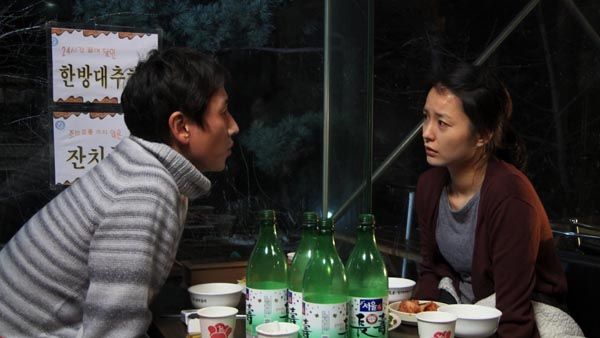
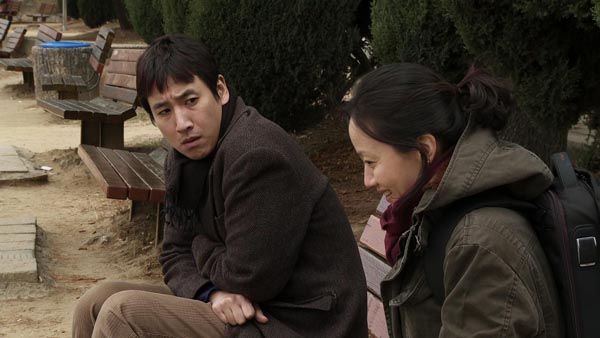
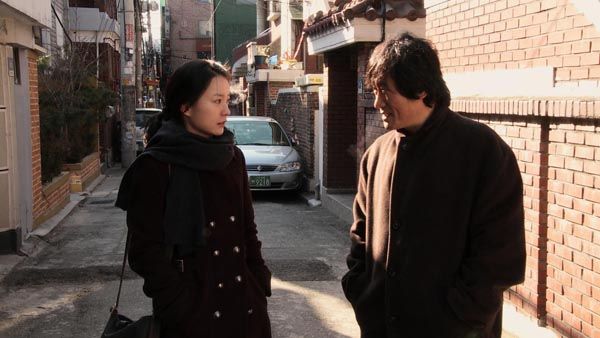
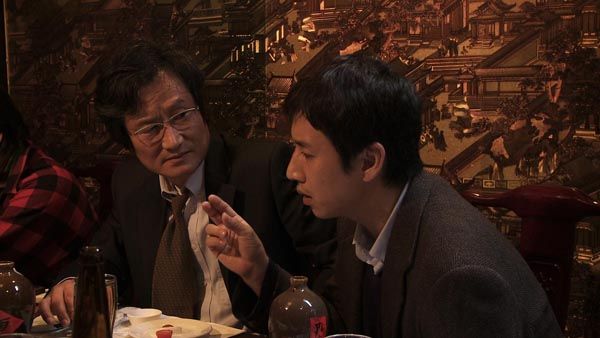
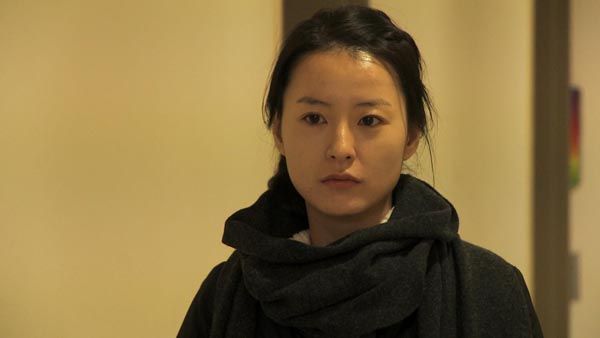
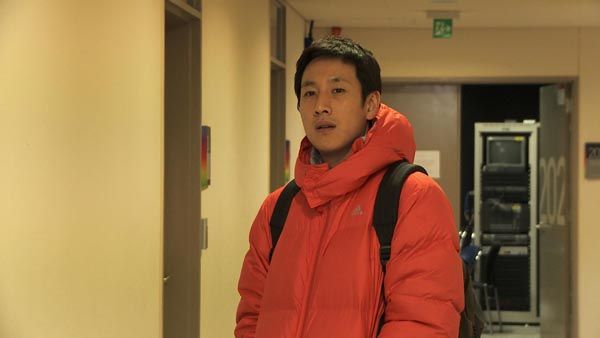
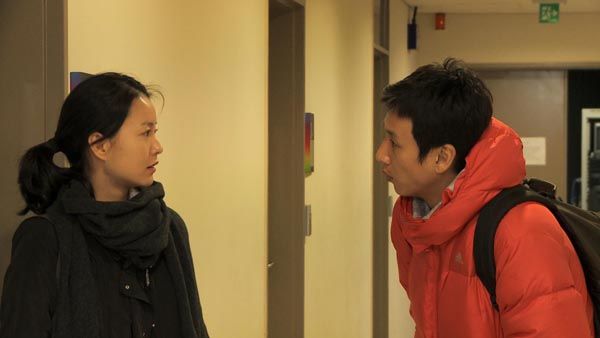
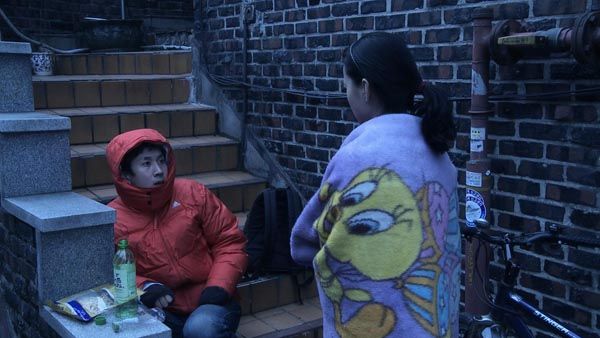

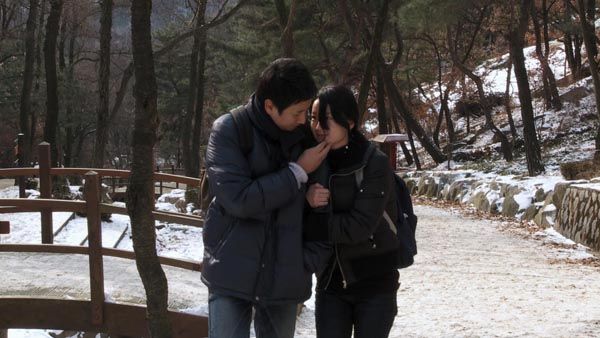
















 sarahinsouthkorea
sarahinsouthkorea
